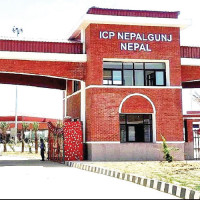- Monday, 29 December 2025
ICT In Banking Business
Sampada Tandan
Information, communication, and technology (ICT) are indispensable factors in this modern world. ICT refers to the technology that makes use of data-driven electronic devices, the internet, and human interaction to enable the user to interface with devices for the purpose of teaching and learning in addition to personal use.
The application of ICT is augmenting every sphere of our actions, including both consumption and services. Banking services, in this regard, are an intangible element that necessitates an effective quality delivery process from both the provider and the taker, with greater security.
In order to enhance the quality of banking services in both private and public categories, the application of ICT has become an imperative element. In this new era, there is a need for banking customers to get better electronic banking services and also have better relations with the employees.
It is also a matter of time to provide efficient services and products to the customers. ICT improves the effectiveness and efficiency of the facilities and services provided by the banks.
ICT Scenario
One can see that information, communication, and technology (ICT) have totally revolutionised the banking industry or sector, thereby changing the manner in which business is conducted nowadays. There is virtually no unit that does not have ICT innovations, and the situation will continue to increase the scope for many years to come. As we can see from the discussion, the effect or impact has both positive and negative aspects.
Whichever school of thought you belong to, it is obvious that there is a cause-and-effect situation. No doubt the arguments, discussions, debates, etc. will still continue because research, experiments, etc. are still ongoing and the results will in one way or another affect the sector positively or negatively.
The solution to its negative impact still remains in my mind: the development of oneself in other skills of human endeavour by way of seminars, training, workshops, formal and non-formal education, specialised training programs, conferences, etc., such that you can easily adapt to changes when the need arises.
Online banking is a technological advancement that has brought about a lot of change. The banking industry has adopted virtual banking to improve business processes, infrastructure, and customer relationships. These changes have had a significant impact not only on the banking industry, but also on online banking customers.
The matrix measures for the improvements added by online banking can be evaluated on comparable levels of service, efficiency, and cost satisfaction for both the provider and consumer of this technology.
Online banking systems present to their consumers a set of information that talks about the benefits of e-banking, including the facility for the customers to control their bank accounts at any time and any place.
ICT Application
The use of information, communication, and technology (ICT) serves in various ways. We can now see the rural area and the urban area being connected, and the urban facilities reaching the rural areas. The scope of ICT is expanding day by day due to increasing customer demand.
Customers demand a fast and easy networking system along with easy functionality of the banking system. This field has helped to simplify the functionality of the banking industry. This has helped to make the banking sector innovative and competitive.
Extensive use of ATMs, internet banking, mobile banking, smart cards, 24/7 services, and the ability to offer a wide variety of products and services have enabled the banks to improve their service. The services offered might be decision-making at the managerial level, savings accounts, wealth management, overdraft services, and so on.
Talking about the pros we have about globalisation and the cultural gap The new technologies allow us to eliminate communication boundaries and interact with each other on a global scale. Globalization leads to cultural homogenization, which means that the world is becoming more similar. ICT enhances the ability of learners to access, assess, adopt, and apply knowledge to think independently, exercise appropriate judgment, and collaborate with others to make sense of new situations.
The void due to regional boundaries can be filled by globalization. ICT technology has been successful in bringing the masses together and has also encouraged sharing ideas on a global platform. It enhances security and also increases the rate of production. The travel cost is minimised as most sectors are digitized. The number of clients is managed through the development of a systematic database. Data entry and recording processes are simplified and accelerated.
Business in today's world means challenges, completion, and competition. Its priorities are the investors' and clients' demands. Feedback is collected as much as possible, and reviews and complaints are sorted out and worked on as needed to satisfy both parties, for which ICT has become very useful and handy.
Time is money. Delay in any case is intolerable for the benefit of the company, and hence the use of communication technology helps to overcome it. ICT has helped conduct video conferences that save a lot of time.
Programs like email, fax, and mobile phones are useful to convey informative data among employees, clients, and suppliers throughout internal and external structures. It has made communication cheaper, quicker, and more efficient. It improves and keeps records of client and customer relationships for the future.
Secure maintenance of customer and company files is vital to the integrity of the company. The information technology advantage comes from the ability to store unlimited amounts of information securely in compliance with regulations. Information is protected from unauthorised access.
It is also provided with provisions such as a backup and restore plan that can affect the organisation in the event of a disaster. ICT also gives businesses the peace of mind that the information they collect and analyse can be properly stored and retrieved whenever needed in the future if it provides organisations with the tools they need to properly evaluate the market and implement strategies needed for a competitive edge.
Importance For Customer
Banks are aware of customers' requirements for new services and have plans to make them accessible. The outdated means of fund transfer have been updated by online services such as e-banking. Now one can transfer the amount he or she likes within seconds through their respective banking apps. Besides monetary transactions, it facilitates the user with e-payment for groceries, food, booking flights, hotels, etc.
And banking statements can be checked without having to visit individual bank branches; it has made daily life easier and simpler.The worry of carrying cash has been eliminated. Banks have been able to help their customers by implementing a self-service inquiry system.
This helps to inquire about and view the transactions in the account. Similarly, installation of an ATM allows nonstop cash withdrawals, remittances, and inquiries about the services. Telebanking has been handy as it provides 24-hour service that involves balancing accounts and making transactional inquiries over the telephone.
For Banks
As discussed previously, over the past decade, the scope of IT has grown to include a wide range of back and front office jobs in addition to a lot of new products. An immediate response to the customer query without mentioning the ledger-keeper is provided, as the terminal is provided to managers and chief managers.
Computer interconnections computerise branches and control offices, allowing for quick and up-to-date data transfer and decision-making.The customer’s data is more secure because the transaction is all online and has left a trace of the transaction, so fraud activities can be easily detected. Online transactions have proper statements stored in the bank's database, so it's easy for the bank to trace any unusual activity and easy to explain to the respective customers.
For Employees
The use of information, communication, and technology (ICT) has helped to increase the efficiency and accuracy of the functions performed by the employees, such as balancing on the right date and calculating interest exactly.
Covering the schedule, receipt of deposits, and automatic printing of passbooks and pass sheets frees the employees from performing these time-consuming tasks and enables them to pay more attention to the needs of the customer.
Threats
We shall not forget about the threats caused by ICT. The threats include encrypted data, malware, third-party services that aren’t secure, phishing, spoofing, and so on. The complexity of the functionality might increase. We might feel social disconnection as well. Moreover, the computer can store a large amount of data.
Hence, data theft is also possible. Sometimes the computer can be devastating due to power loss for many businesses, as they heavily rely on it. They can lose the value permanently, and that can affect them for a long time. People are frequently the weakest link in the security chain because they can be duped into providing sensitive credentials.This can affect a bank's employees and its customers.
What’s Next?
Everything we see here has the gist of information, communication, and technology (ICT) hidden in it. Basically, we see ICT as taking up technology trends in a safe and secure manner to deliver innovative, effective, and efficient services to the satisfaction of people of different demographics.
Remembering the days back when we had to stand for hours just to withdraw cash to acquire a banking statement and were more prone to theft and burglary Consumers expect hyper-personalized and relevant communication from all of their online and offline interactions. They want their financial institutions to keep them informed about their finances and notify them if something needs their attention. In essence, they look for a self-guided financial wellness solution.
But what exactly does "self-guided financial wellness" mean? In short, it means proactive financial advice at the right moment and helping people stay on top of all of their financial matters in real-time. People no longer simply want to trust their financial institution with their money. They want to trust that their financial institution understands them and has their best interests at heart when it comes to financial matters.
(Tandan is a computer engineering student)















